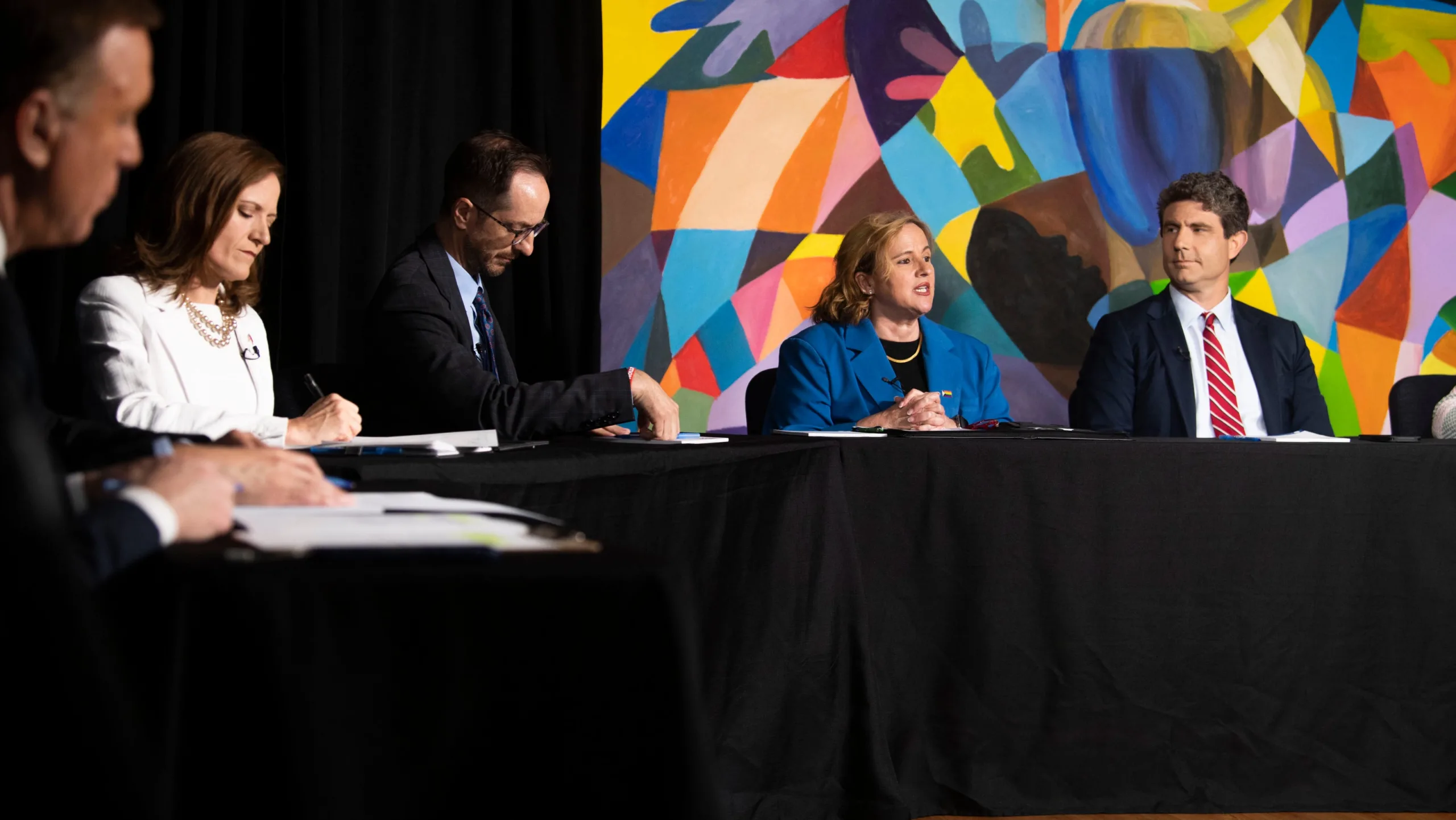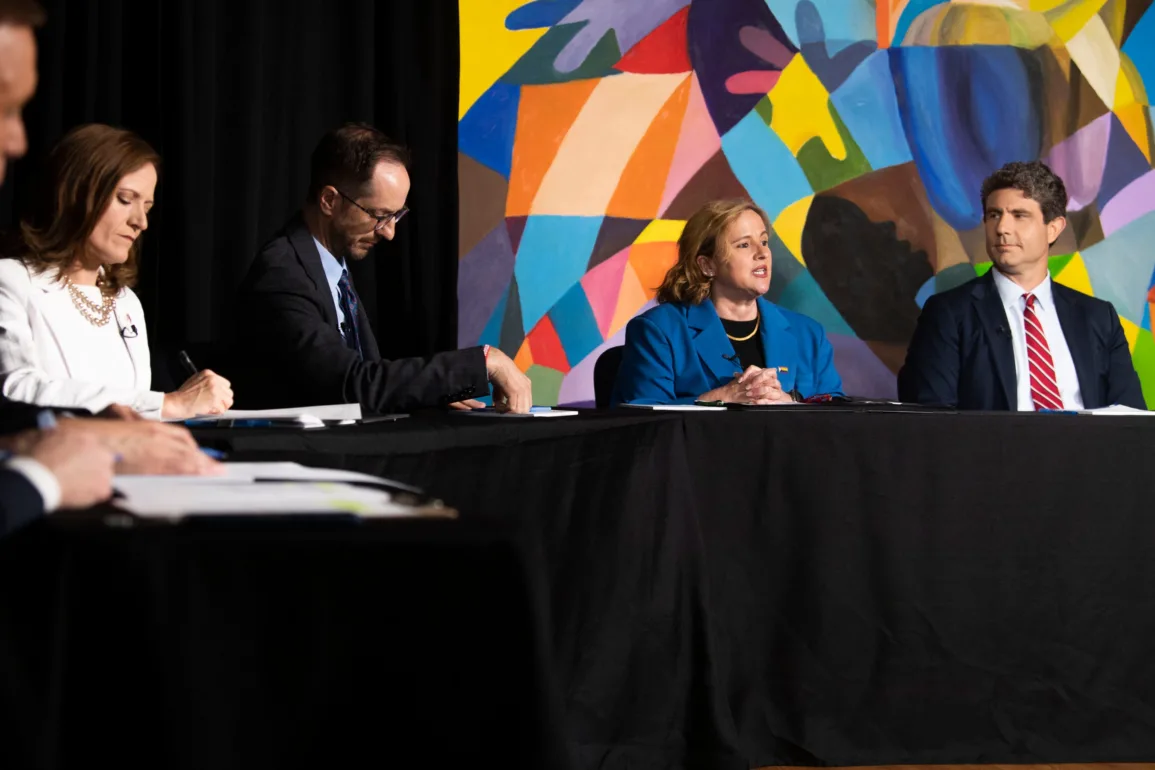
The mayoral candidates got a little rowdier at Thursday’s Nashville Mayoral Debate as early voting rapidly approaches. A prominent feature of this race has been the struggle to stand out, compounded by a lack of polling that has made it difficult to gauge how effective each candidate’s strategy has been.
Recent television ads show some candidates injecting more personality into their well-worn talking points. That trend continued on the debate stage with the barbs a little more pointed this time around.
Early voters will cast the first ballots for Nashville’s new mayor in just one week, around the time second-quarter campaign finance reports will be available to offer some insight into the strength of the various campaigns.
Eight candidates were invited to participate in the debate based on their fundraising totals and elected positions:
- Heidi Campbell, state senator representing parts of Nashville
- Jim Gingrich, former chief operating officer of AllianceBernstein
- Sharon Hurt, at-large Metro Nashville Council member
- Freddie O’Connell, Metro Nashville Council member representing Nashville’s downtown district
- Alice Rolli, business and education strategist, and campaign manager for former Sen. Lamar Alexander
- Vivian Wilhoite, Davidson County assessor of property
- Matt Wiltshire, former economic development director with experience in affordable housing
- Jeff Yarbro, state senator representing parts of Nashville
Thursday’s debate, hosted at American Baptist College, is the third in a series of mayoral forum events hosted by The Tennessean in partnership with NewsChannel 5, Belmont University, American Baptist College and the League of Women Voters of Nashville.
Here are key moments from Thursday’s debate:
Candidates take swings
Candidates’ congenial approach thawed Thursday as moderators presented an opportunity for candidates to ask questions of each other. Several seized the opportunity to pose incisive questions, with Wiltshire landing in the hot seat on several occasions.
Hurt, who recently released a campaign ad associating Gingrich and Wiltshire with “privilege,” asked Wiltshire how his administration would differ from those of the white male mayors before him.
Wiltshire paused to recognize the administration of Megan Barry, the first woman to serve as Nashville mayor, before agreeing that “for far too long, the folks who have been mayor have come from one particular part of our city.”
“I commit that as mayor, my administration will reflect the diversity of this city in all the ways: gender, racial, geographic, ethnic (and) political diversity, because folks should feel connected to the administration.”
Yarbro lobbed Wiltshire a question about a recent campaign fundraiser hosted in Austin, Texas, by the campaign treasurer for conservative firebrand Sen. Ted Cruz. Wiltshire explained the event was hosted by his cousin and her husband, and while they “don’t always agree politically,” “he’s family, and I love Brad.” He touted it as a bona fide of his ability to work across the aisle.
Rolli also took aim at Wiltshire, pointing out that he had not joined a petition effort she led to protect Fort Negley from a 27-building development in 2017 and asking if he would “consider those types of backdoor deals” in his administration.
Wiltshire said Fort Negley is a “vital asset” to Nashville and its history that has been neglected for too long, and committed to restoring the site. He’s not in favor of “backdoor deals,” he said, noting that there are many petitions he hasn’t signed, and he was sorry he missed that one.
When it came his turn, Wiltshire quipped that he felt “like I should ask myself a question,” which got a chuckle. Instead, he turned to Rolli, asking about her constant criticism of Metro’s spending and high debt, saying Metro incurred the debt to build critical infrastructure.
“What school would you not have built? What sidewalk would you not have constructed, and what street would you not have paved to help Nashville get where it is today?” he asked.
Rolli argued that Metro is currently in more debt than the entire state of Tennessee, because the state has taken a “pay as you go” approach for roads and other services. Rolli argued that Metro’s AA bond rating is good “because rating agencies believe that you will raise taxes.”
“If we continue doing what we’ve done for the last 20 years and continue to elect people who take a tax-and-spend approach, you will not be able to spend money on the things that you want to spend money on,” she said.
At one point, Yarbro referred to a “pervasive notion that downtown — Freddie’s district — gets all the love … and the rest of the county gets ignored.”
“I don’t think that most people in Nashville want to pit downtown against the rest of the county,” he said.
Gingrich continued to take swings at competitors who have already served in office for missing opportunities to improve the city.
“Why does the infrastructure always follow (development) as opposed to having leaders in place that actually are capable of thinking ahead and willing to make the investments as opposed to kicking the can time and time again,” Gingrich said when asked about his top infrastructure priority.
Campbell concluded her remarks by suggesting candidates look toward Nashville’s future.
“What you want to see in a mayor is somebody who is able to move forward with Nashville benefiting the most from the plans that are being made from here on out, not to make an entire campaign about complaining about something that has already been done.”
Police and public safety
On the topic of police and public safety, no candidate’s position has stood out as particularly bold.
That theme continued Thursday as candidates largely agreed on basic things: Ensuring citizens feel safe is critical. Oversight and accountability are essential. Metro’s police department needs to be appropriately resourced.
Candidates’ takes on license plate readers largely adhered to the idea that the technology could be useful with the caveat that it its use is shaped with community input and controlled with strict accountability measures.
Wiltshire, who was endorsed by the Fraternal Order of Police, said Nashville’s police department “has performed exceptionally well in many cases” but has been under-resourced for too long.
“It’s important that we have trust in the police department, and the Community Oversight Board played a vital role in that,” Wiltshire said. “I think the move by the state to overturn what was passed by the citizens of Nashville was absolutely the wrong thing. It erodes trust and makes the citizens less comfortable with things like license plate readers, so these are integrated into each other.”
Campbell spoke of efficiencies to be gained in Nashville’s emergency response processes by using smart cities technology. That includes license plate readers, she said, so long as parameters are put in place to prevent abuse.
Hurt said she remains torn on license plate reader use, acknowledging harm to minority communities and the potential for helping law enforcement arrest violent offenders. She ended by emphasizing hope and prosperity as a means of reducing crime.
Gingrich said Nashville’s violent crime rate is higher that peer cities like Charlotte and Austin, and Nashville needs a “comprehensive crime prevention strategy that engages our vulnerable.”
Gingrich said he would create an office within his mayoral administration responsible for working with community partners, Metro departments, nonprofit organizations, faith-based organizations and others to promote public safety, mainly through proactive youth programs. That could include after school and summer programs, summer job opportunities and violence interruption programs, he said.
“We do need to properly resource the police department, and that includes technology. In 2020, it took the police force 9.2 minutes to respond to a shooting. Last year it was 16 and a half.”
Yarbro said trust is critical “so we can ensure that our law enforcement has the full range of tools and technologies to keep people safe.”
“It doesn’t matter if we’ve done everything else right. We absolutely have to ensure that we have a well-qualified, well-compensated, well-equipped police force that’s also accountable and trusted and truthful with transparency and oversight.”
Rolli said she sees license plate readers as an issue that speaks broadly to crime in Nashville. Technology, she said, can act as a multiplier for Nashville’s “depleted police force.”
“We are at least 200 officers short and currently two thirds of the crimes that are reported are never cleared, and that makes criminals more bold and it makes victims feel more helpless,” Rolli said.
License plate readers could also provide data that Nashville can share with neighboring counties, some of which already use the technology, she said. “No one stops, from a crime perspective, at our county line.”
Supporting the African American community
On the campus of American Baptist College, which will celebrate its 100th anniversary next year, candidates explained how they would ensure Nashville’s Black community is not left behind amid the deluge of growth and development.
“An African American woman in charge is not going to forget her own community, nor am I going to forget your community,” Wilhoite said.
Hurt promised to support Nashville General Hospital and establish shuttle services for seniors, touting her victory negotiating a provision in the Titans stadium deal to have 25% of associated contracts go to small, minority and women owned businesses.
In the day-to-day, Gingrich said, minority communities are left behind in ways like which neighborhoods’ power is restored first and which neighborhoods’ roads are salted first. Gingrich said the proposed Nashville Fairgrounds Speedway deal with “another billionaire” would again leave neighborhoods behind.
“And yet we can’t sort out what we’re going to do with Nashville General Hospital,” he said.
Rolli said the city should set its highest priority on ensuring all children — including black and brown children — can read proficiently. Rolli cited low literacy rates at Metro Nashville Public Schools and noted incoming adult prison inmates in Tennessee typically are only able to read at the first- to third-grade reading level.
“It should make every parent and every taxpayer in this city angry that we are dooming our children to failure,” she said.
Campbell said Nashville’s history of racism shaped great Civil Rights leaders like John Lewis and Diane Nash, and said the city still has more work to do.
“It’s 2023, and we are still one of the most red-lined cities in the nation,” she said, asserting that the next mayor should work to right inequities between schools in high-income and low-income neighborhoods.
Quotes of the night
- “Everyone else on this stage will raise your taxes”: Rolli shot back after Wiltshire asked her what schools she wouldn’t have built to avoid debt. One of Rolli’s main talking points is criticizing the city’s debt and tax levels.
- “That’s not the rule, Jim”: Wilhoite admonished Gingrich for asking the entire group a question rather than an individual as instructed. He wanted a show of hands from candidates who had been threatened over an issue. His campaign has said Nashville Fairgrounds Speedway supporters warned him they would attack his candidacy since he does not support a proposal to renovate the speedway.
- “It should be possible to drive to work or to drop your kids off at school without using a GPS every single morning”: Yarbro bemoaned the state of the city’s roads and said they were his top infrastructure priority. Wilhoite agreed. “You drove over here today, and you hit a pothole, I guarantee you,” she said to the crowd.


